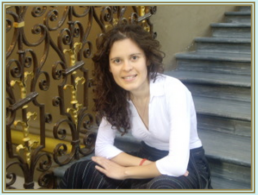Biography

Originally from Barcelona, Spain, Eva Caballero was awarded a scholarship to study at Trinity College of Music, London, with Daniel Pailthorpe. Towards the end of her BMus (Hons) degree, she discovered the baroque flute with Stephen Preston and continued her studies on historical flutes with Lisa Beznosiuk at the Royal Academy of Music.
Eva took part in the Ann and Peter Law OAE Experience in 2009. After that she completed the ‘Formation Supérieure’ with ‘Jeune Orchestra Atlantique,’ in France, an orchestral and chamber music training on classical and romantic repertoire on period instruments. Langrée, Minkowski, Herreweghe, Lonquich and Malgoire were some of the conductors on these projects.
Her work involves performing in London-based ensembles and a variety of orchestras, including Orchestra of the Age of Enlightenment, English
Baroque Soloists, The Sixteen, Gabrieli Consort & Players, Solomon’s Knot, Classical Opera and Armonico Consort. She has also given recitals at the Handel House Museum, Raynham Hall, the Wallace Collection and St. Martin-in-the-Fields among others.
Collaborating with dance and theatre companies, she has worked on improvisation and modern techniques performing in the ‘Tête à Tête’ Opera Festival and ‘IV Festiwal Atelier’ in Poznań, Poland.
Eva has won numerous awards as a chamber music performer in the UK and Spain including XIII Paper de Música de Capellades, Premi Ciutat Manresa, IX Pòdiums de St. Joan de Vilatorrada and the Anglo-Czech Trust Competition. She was also a finalist in 2008 at the Fenton House Chamber Music Competition.
Eva is also an enthusiastic educator and works as a flute teacher in North London.
A bit more about Eva
How did you discover the flute?
I was six years old and the music teacher brought a flute to school. It was love at first sight because I was enamoured that pressing one key led others to move! When I heard the sweet sound of the flute I fell into a deep love affair that continues to this day.
Which pieces of music inspires you most?
I love operas and oratorios. When they are well sung they become the most beautiful music for the soul, I guess this is what any instrumentalist tries to do, sing though their instrument.
What is it that draws you to perform in orchestras?
I love to be part of a big group and the magic that happens when we work together to bring a piece of music alive.
Since when and why did you start playing wooden flutes?
It has been a slow process. When I first came to study at TCM with Daniel Pailthorpe, he played on modern wooden flutes and I loved the quality of the sound. After a couple of years I bought a wooden headjoint (this is what I could afford at that time) together with a metal body. Then I started playing historical flutes and got more familiar with wooden.